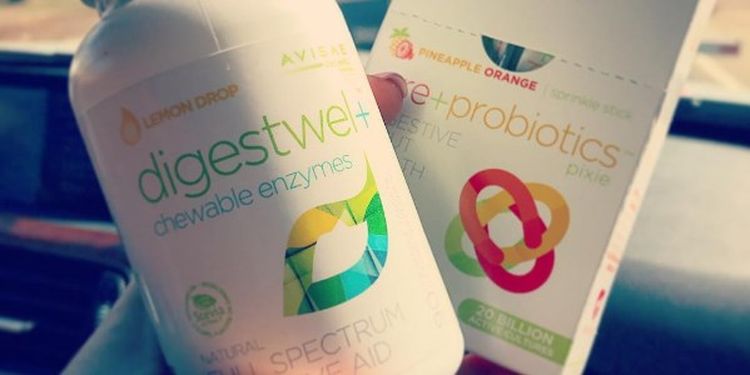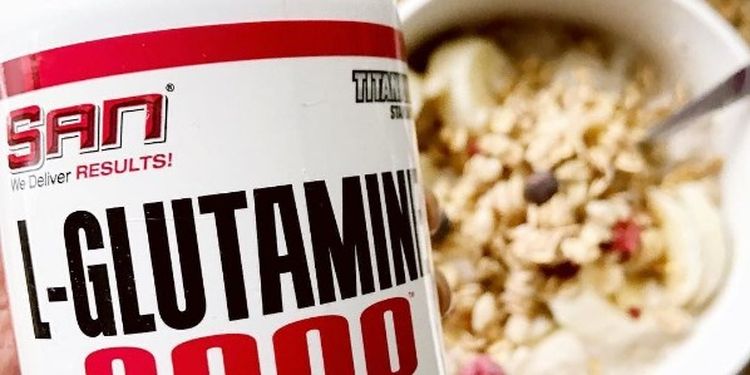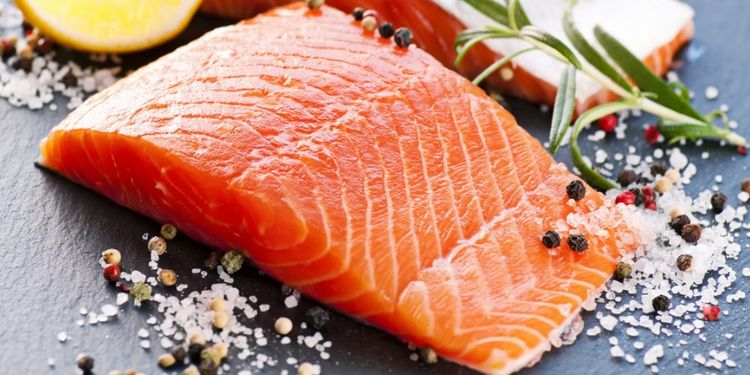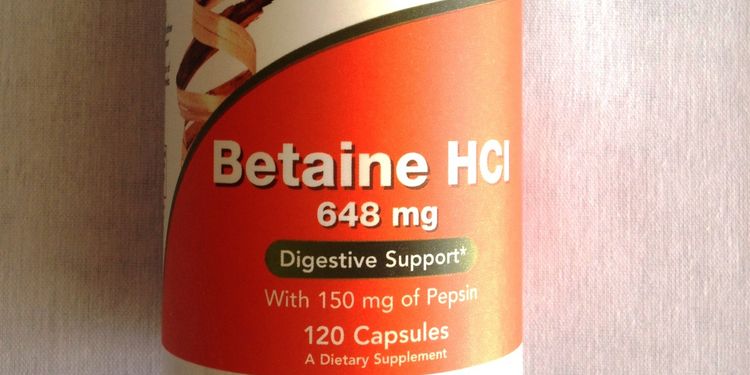Four Supplements That Digestive-Symptom Sufferers Should Know About

Eating meals used to feel like walking through a minefield.
Sometimes I would make it through without a scratch— I’d eat my meal and would feel fine afterwards. Other times, however, I’d be hit with painful indigestion after eating.
The symptoms would vary— bloating, gas, stomach pains, acid reflux— but two things were clear: my digestive system was in pain and it needed help!
While shifting to a healthier diet solved many of my problems with indigestion, it wasn’t enough. My digestive system still needed extra support.
Over the years, I experimented with different supplements and found that four in particular worked best for me: digestive enzymes, l-glutamine, betaine, and probiotics. Adding these supplements to my diet has done wonders for my digestive health!
Let’s take a closer look at these four supplements and why you might want to consider adding them to your diet as well.

Digestive Enzymes
What are Digestive Enzymes?
Digestive enzymes are essential parts of your digestive system. They help break down the food you eat into bits small enough to be absorbed into your blood stream.
Without the digestive enzymes in your saliva, stomach, pancreas, and small and large intestines, you wouldn’t be able to access the nutrients in your food. Last time I checked, this was a pretty important bodily process!
How Do They Help?
Digestive enzyme supplements help by giving the body an extra boost of digestive power.
They help your body break down difficult-to-digest proteins and sugars (like gluten or lactose) and generally reduce the workload of your GI tract. This can lead to increased nutrient absorption, reduced risk of nutrient deficiency, and reduced symptoms of digestive issues like acid reflux, IBS, and leaky gut.
Digestive enzymes can also counteract the natural enzyme inhibitors found in foods like peanuts, nuts, seeds, beans, egg whites, wheat germ, and potatoes.
How Do You Use Them?
Digestive enzymes come from three sources: fruit (usually pineapple), animals (e.g., ox or hog bile) and plants (e.g., yeast or fungi).
Your best bet for overall digestive support is to take a full-spectrum enzyme blend.
You can also purchase blends that include lactase (for support digesting dairy products), betaine HCL and digestive herbs (such as ginger and peppermint), and specific blends for gallbladder or pancreas issues.

L-Glutamine
What is L-Glutamine?
L-glutamine is the most abundant amino acid in your bloodstream. It’s a vital building block of protein and is most known for its power in helping people burn fat and build muscle.
How Does It Help?
While L-glutamine has long been a favorite supplement of fitness enthusiasts, it may soon be a favorite of nutritional enthusiasts as well! Research now shows that L-glutamine:
- Helps the intestines rebuild and repair and prevents further intestinal damage
- Reduces intestinal inflammation
- Heals ulcers and leaky gut
- Acts as a vital neurotransmitter, promoting healthy memory, concentration, and focus
- Improves metabolism
- Promotes detoxification in the body
- Fights cancer
- Reduces sugar and alcohol cravings
- Helps diabetes by balancing blood sugar levels
- Promotes healthy bowel movements, reducing the symptoms of diarrhea and IBS
- Promotes fat loss and muscle growth and reduces muscle loss
- Improves athletic performance and endurance
- Boosts the immune system and fights infections and disease

How Do You Use It?
You can increase your body’s supply of L-glutamine by eating the following foods: bone broth, grass-fed beef, spirulina, Chinese cabbage, red cabbage, beans, parsley, raw spinach, cottage cheese, asparagus, broccoli, fresh-caught fish (e.g., tuna, cod, and salmon), venison, and turkey. Dr. Axe recommends at least three servings of these L-glutamine-rich foods each day.
There are two kinds of L-glutamine supplements: regular L-glutamine and trans-alanyl or alanyl-L-glutamine. Regular L-glutamine should be taken with food to ensure proper absorption. Trans-alanyl or alanyl-L-glutamine can be taken on an empty stomach.
Dr. Axe recommends supplementing with 2-5 grams (10 grams for serious athletes) of L-glutamine either right before or after a workout along with a small meal.
If you’re taking L-glutamine long-term, Dr. Axe also recommends supplementing with B vitamins, which help control glutamine buildup in the body.

Betaine HCL
What is Betaine HCL?
Betaine HCl, aka betaine hydrochloride, is an acidic form of betaine, a naturally occurring amino acid derivative most known for its use in supporting heart health.
How Does It Help?
Betaine HCl helps digestion by increasing levels of hydrochloric acid in your stomach.
This helps your body break down foods and absorb nutrients (especially proteins, vitamin B12, iron, and calcium). Betaine HCl also inhibits bacterial overgrowth in the small intestine and helps the stomach protect itself from pathogens.
How Do You Use It?
I’ve found that taking one or two betaine HCl capsules at mealtime helps my digestive issues best, though some need to take more capsules to notice a difference. Dr. Izabella Wentz recommends taking as many capsules as you can without feeling acid reflux symptoms like burping, burning, etc.
Some also notice improvements in symptoms taking betaine HCl either before or after meals.
Chris Kresser recommends always supplementing with betaine HCl that includes pepsin, because if your stomach needs more HCl, it likely needs more pepsin as well.
NOTE: Betaine HCl should never be taken alongside anti-inflammatory medications such as aspirin or ibuprofen. Doing so can lead to ulcers and gastric bleeding. Those with liver disease, heart disease, kidney stones, diabetes, or high cholesterol should talk to a doctor before taking betaine HCl.
Finally, some people have reported mild side effects of diarrhea, stomach upset, and nausea from taking betaine HCl.

Probiotics
What are Probiotics?
Probiotics are helpful, healthy strains of bacteria (such as Lactobacillus or Bifidobacterium) that live in your gut.
How Do They Help?
These tiny creatures are essential to your survival! They help your body digest foods, crowd out bad bacteria, yeast, and fungi, produce vitamins (like B12 and K2), and keep your immune system running healthily.
Among other benefits, supplementing with probiotics can help:
- Boost your immune system
- Improve digestion
- Increase your overall daily energy
- Heal leaky gut and IBS

How Do You Use Them?
You can add probiotics to your system through supplements or foods like raw sauerkraut, kimchi, pickled vegetables, kombucha, kefir, yogurt, and beet kvass.
When supplementing, make sure to only buy and take supplements that contain live cultures! Pay attention to manufacture and expiration dates and avoid exposing your probiotics to too much light, heat, or moisture, as this can affect the efficacy of the capsules. Make sure the probiotics advertise colony-forming-units (CFUs) in the billions as well.
You can also supplement with soil-based organisms (SBOs), which contain healthy bacterial strains typically found in soil. SBOs are more durable than typical probiotic supplements and deliver many of the same health benefits as other probiotic strains.
Follow the directions on the bottle to determine dosage.
NOTE: If you have small intestine bacterial overgrowth (SIBO) or a histamine intolerance, talk to your doctor before taking probiotics.
Summary
Whether you suffer from a life-threatening digestive disease or occasional digestive troubles, I highly recommend trying one or all of the above digestive supplements.
Adding probiotics, L-glutamine, betaine HCl, and digestive enzyme supplements to my daily routine has vastly improved my digestion, energy levels, and overall health.
So give them a try!
If you do decide to try these supplements, just remember to take it slow. Be gentle with your system and introduce them to your diet one at a time. Give yourself a few weeks to get used to each supplement and adjust dosage as necessary.
